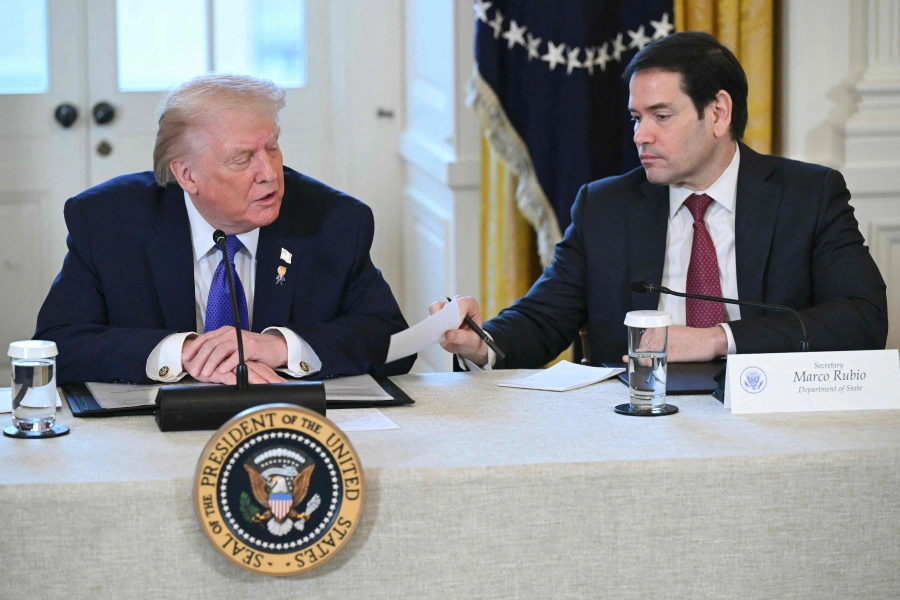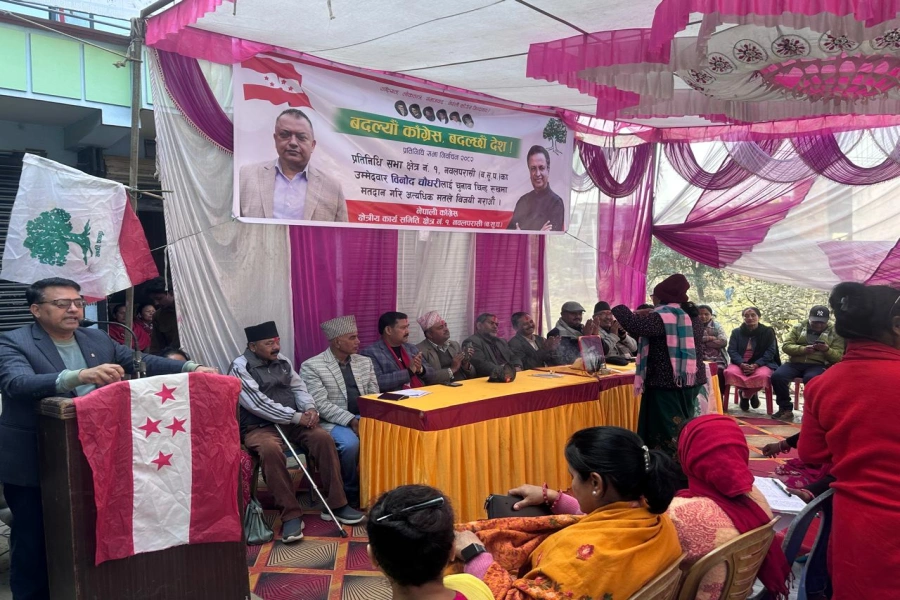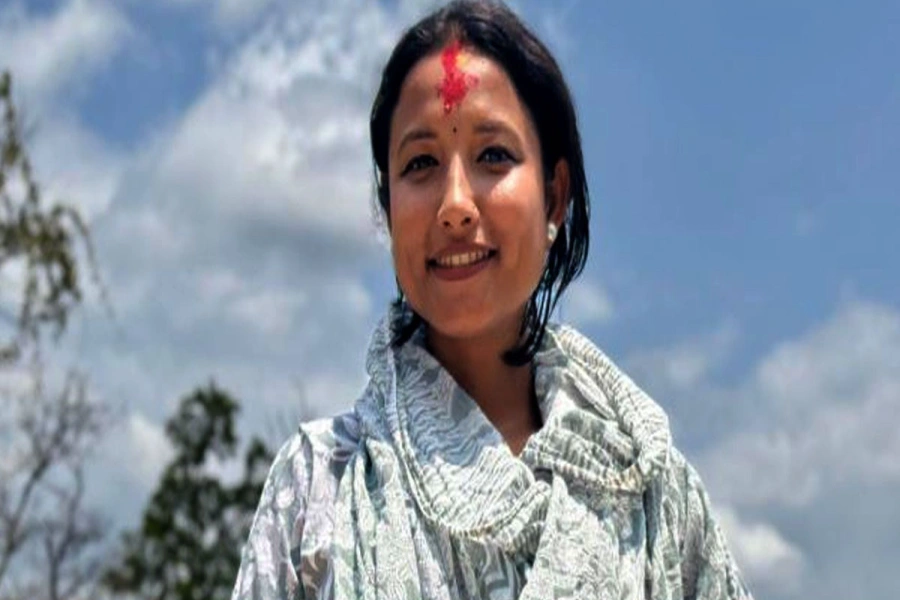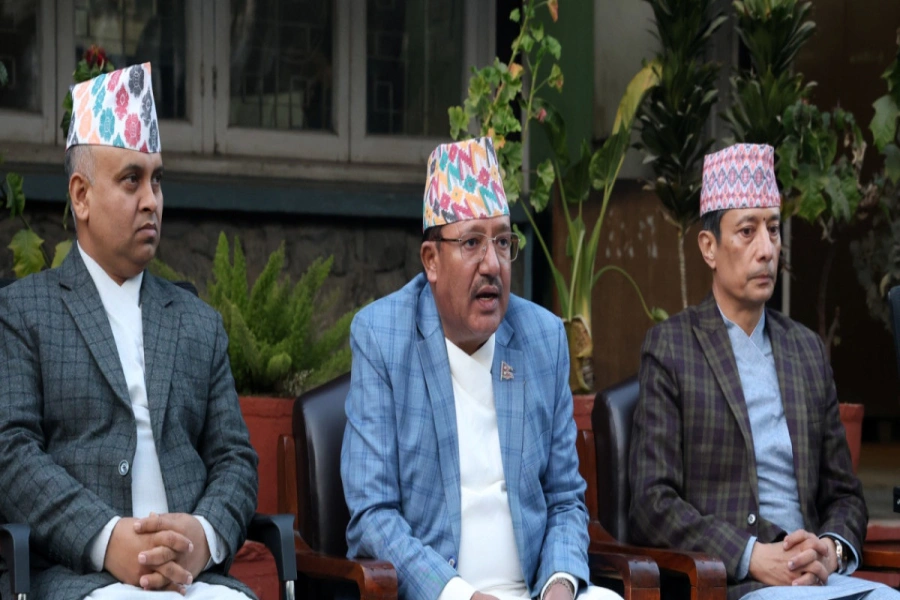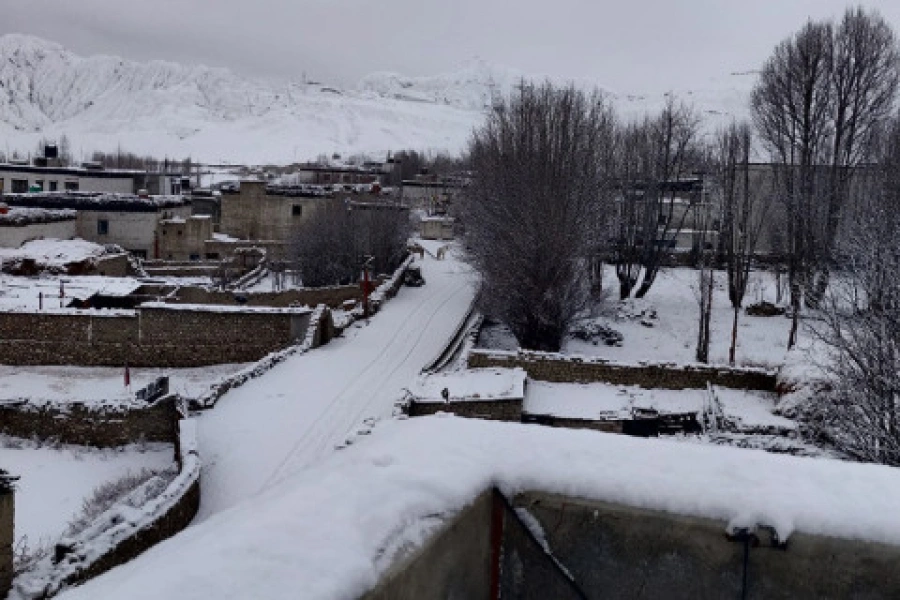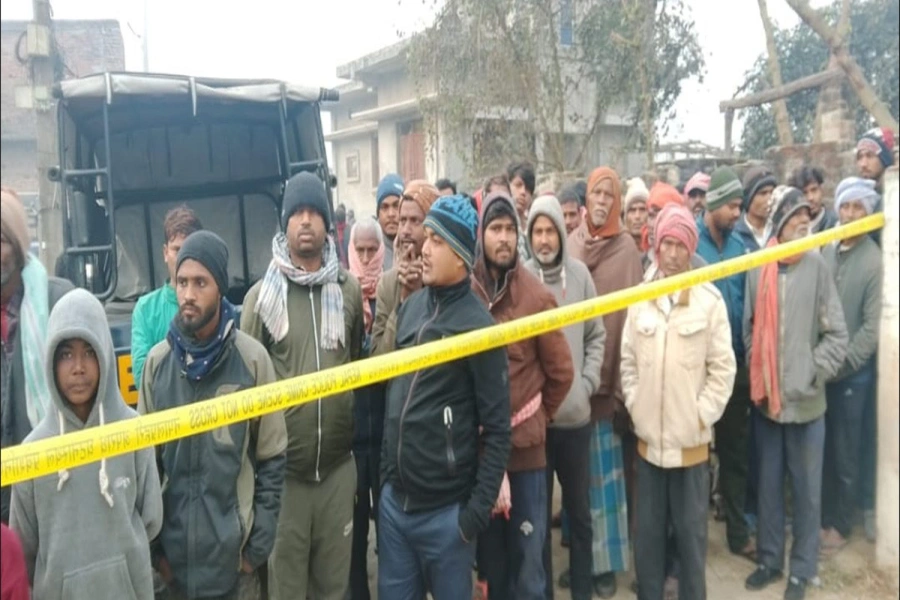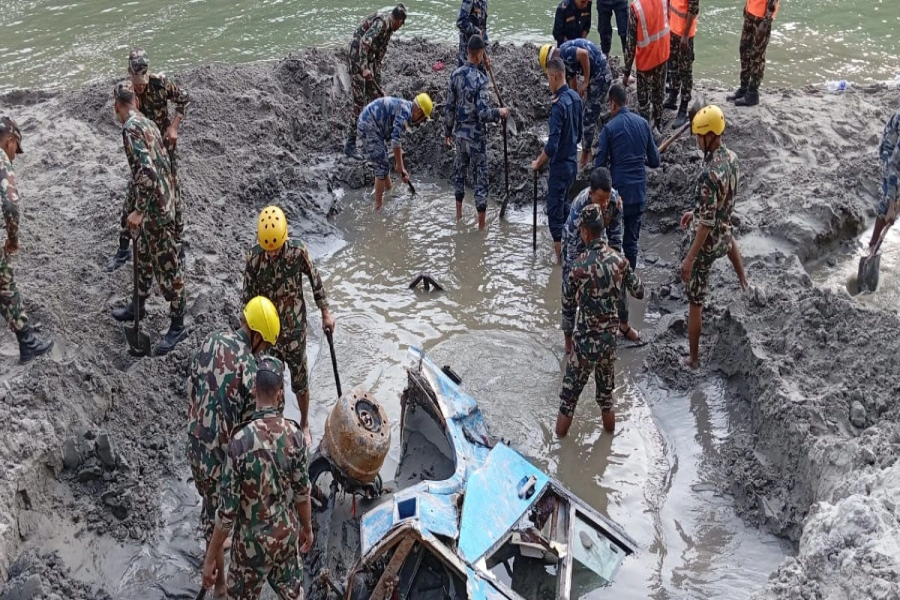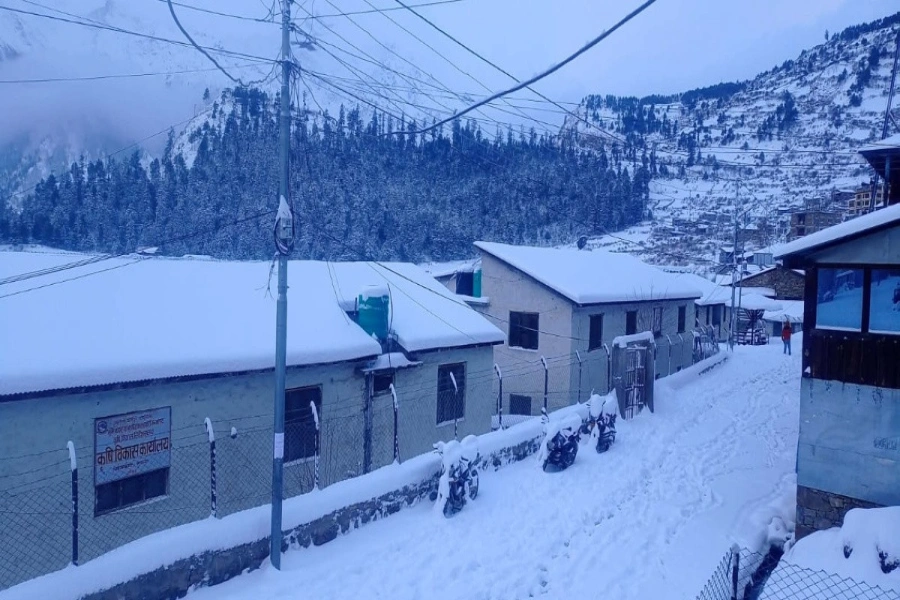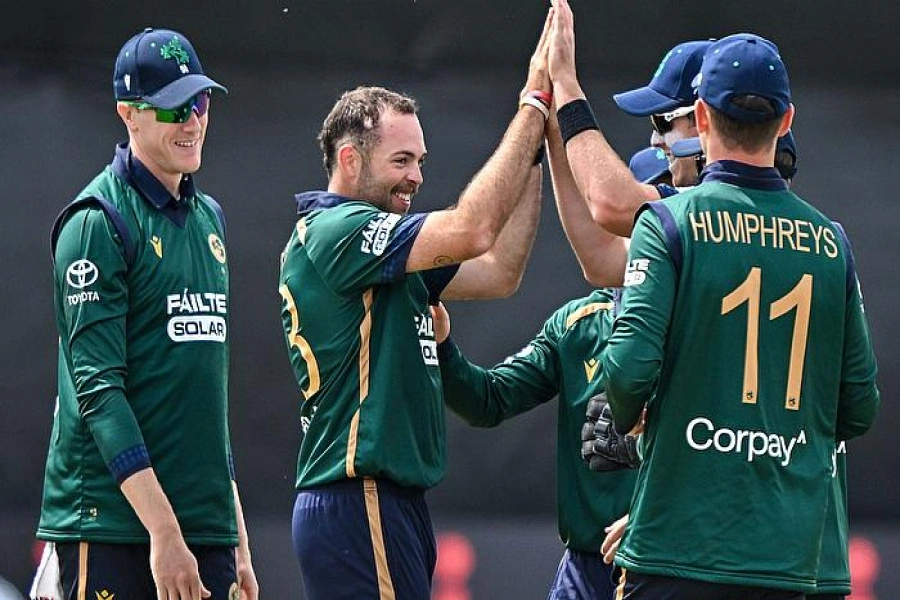Pokhara charmed as usual with its bipolar temperament – its idyllic afternoon, tempting boat-ride on Fewa lake and the muted air that sings you to a siesta; its frenzied evening with brightly-lit shops and eclectic mix of restaurants lining the truly walker-friendly pavements (unlike the pot-holed, foes-of-feet streets of Kathmandu) with a medley of music oozing from them and people milling about happily. You get the feeling that if Utopia exists anywhere, it is in Lakeside, Pokhara. It’s a feeling reflecting only half the truth about the place, with its dark underbelly and festering drug abuse problems among young people but a feeling fused with positive illusion for an otherwise disillusioned urbanite, nonetheless.
Rising early is a hateful urgency of traveling. I consumed breakfast most grudgingly as sleep still tip-toed around my eyes and loitered there as I boarded the small plane carrying mostly international tourists to the place that inspired the song Jomsom Bajaar ma. We were forewarned by many of its blustery noontime winds and of the emptiness that would then fill the streets. How ghastly could the winds be? Would they sweep us off the earth? Was that the liberation, the elusive Mukti, which people blathered incessantly of? This intrigued us singularly.
Down below was the Gandaki river snaking its way through the landscape. It slithered across rocky banks with houses that looked like tiny playthings in danger of plopping right into the river at the slightest whim of Nature. I pressed my nose against the window and squinted in a rather silly attempt to peek into the tiny houses and at the tiny people that now seemed to inhabit them. I began to feel like God in high Heaven looking down at the mortals. This is probably how God feels peering at us. He/She probably chuckles at our small size and huge egos that spill over and feed our ceaseless rivalries, fuel our big wars and fan our petty little squabbles. Being God sure was fun because I wasn’t at the receiving end of the sadistic laughs. The fun did not last long, however, as I felt lethargic and began to yawn heavily, thinking this would be a plane ride like the countless other times. It’s incredible how we constrain our experiences with our assumptions and limit the endless possibilities of being taken completely by surprise.
Like theater curtains parting slowly, suddenly, to reveal the playwright’s vision, the snow-dappled Himalayas of the Annapurna and the Dhaulagiri on each side, with smaller hills, both verdant and dry, nestled in the arms of the majestic mountains, unfolded with their glorious, mesmerizing beauty. In the midst of these giants flowed the rollicking Kali-Gandaki river, penetrating through the crevices, the nooks and crannies of rocks and boulders that cordoned off its otherwise wild, wanton course and gave it instead its voluptuous, seductive curves. The exhilaration among the passengers was palpable. As if in response to the pulsating excitement, the plane lowered in altitude and flew dangerously close to the brown hills speckled with patches of green. While others were busy committing the present moment to past memories through their cameras, I struggled with the excruciating temptation to stick out my hand and touch the hills, caress the luscious green trees, breathe in the thin but pristine air.
The plane swooped down unexpectedly and touched what appeared to be the edge of a cliff. The violent thrust of the landing sent shrieks all around. Within minutes we were standing on the tarmac of the Jomsom airport, facing what were to me uncomfortably close Nilgiri mountains. Never had I stood so close to mountains and my heart jumped to my throat. I couldn’t look at them for a long time and my bemused younger siblings instantly devised stories of the Nilgiris coming to life and chasing me through Jomsom’s empty noontime streets.
The much hyped Jomsom bazaar was a two-minute walk from the airport and we located our hotel easily. Like most places in the area, this one was also Thakali-owned. It was barely 10:30am so we decided to take a walk before the notorious noontime winds liberated us from this world.
The streets were laid with large, square stones, many severely chipped. The Nilgiris were on our right and on our left were desert-like hills, coarse and a dull shade of brown. We walked to the farthest end of the main street up to a small bridge that connected to the jeep station with vehicles to Muktinath for private hire or public transport. Hooray! No mule ride for me! Muktinath trip was reserved for the next day with an early start. Today, it was Marpha with a stop at the government-run horticultural farm, famous for its delicious apples and the distillery for their apple brandy. Noontime was fast approaching but there were no signs of the ominous winds. “Another myth,” we concluded as we descended the sloping edges of the main street that led straight to the stony banks of the Kali-Gandaki river.
Mankind’s relationship to water is a primordial one. Indeed, all life and early civilizations originated at the edges of the great waterways of the world. The hours of frolicking, gallivanting over small rocks and sprawling ourselves on the gigantic ones, listening to the music of the river as we soaked in the morning sun was an incredibly spiritual time. More spiritual, I must confess, than the actual visit to Muktinath. Temples are nice places but one cannot necessarily find that spiritual connection, that oneness and tangibility with an intangible force, and mostly that peace of mind, by temple visits alone. For my mother, however, it was a pilgrimage of a lifetime and so we went. The journey, as always, far superseded the destination. But first, Marpha.
It was an almost decrepit cab but the only one available. The driver was a young gregarious fellow who drove through the bumpy road with shocking dexterity. Trekkers in full gear waved past us and somber-faced mules walked on their frail, agile limbs with loaded backs. The crisscrossing mountain vistas, the distant waterfalls, and the perfect coexistence of wind, water, rocks, dust, and green are impossible to describe – one must feel it, see it, be one with it, in flesh and blood. The village of Marpha with its medieval looking houses and red-tinted roofs, and vast expanse of buckwheat fields, rose up like pop-up art. We drove past them to the apple orchards and the distillery to get the apple brandy first. It was a small place in a dilapidated condition but from its tap flowed some of the strongest brandy of its kind. We took a quick sample which gave an instant kick. With much reluctance, the manager gave us a few bottles for purchase and we happily tucked it in the backseat of the cab.
The narrow cobblestone streets were reminiscent of my walks through the old town of Geneva. Shopkeepers scrambled for our attention to sell their souvenirs that sat gathering dust. We strolled through the streets, bought some trinkets, and headed out into the open fields, pausing to still the moments in our cameras. It was getting dark soon and chilly too. We drove back to Jomsom silently – stunned by the intense beauty, simplicity, and sheer magic of Marpha. Later that night, the brandy came in handy to keep the chill off as we melted into sleep.
“Those are hills. Snow fell on them so they became Himalayas,” said the cocky driver to Muktinath early next morning. The panoramic visions en route were simply breathtaking. With every blink of the eye the mountains, the hills, the fields took on a different personality. Trees with fabulous fall colors dotted the hamlets that appeared sporadically. Even in this extreme poverty, dingy living conditions, and harsh climate, there was a semblance of blissful harmony between the people and their surroundings. But I emerged each time with frustration at the sorry state of sanitation. This has been recurrent throughout my travels in South Asia – people simply don’t care about the condition of one of the most important places we ever go to in our lives: The toilet. Massive awareness and investment in creating cleaner, more hygienic latrines is an urgency that cannot be overstated.
The trek to the Muktinath temple was a mere 30-minute walk with nothing sensational except the haunting beauty of Nature. Offerings were made, prayers rendered and holy water sprinkled on our heads. There was not much left to do except head back and enjoy the sounds of silence at an altitude where you could touch the sky with your fingers and suck in the thin air that tasted like a sip of brandy. That was salvation – Mukti – the feeling of being liberated simply by getting drunk on the intense beauty of God’s stunning creation that is Mustang.
bistha@gmail.com
'Sip sip' from 'Arjun Patiala' out now!




